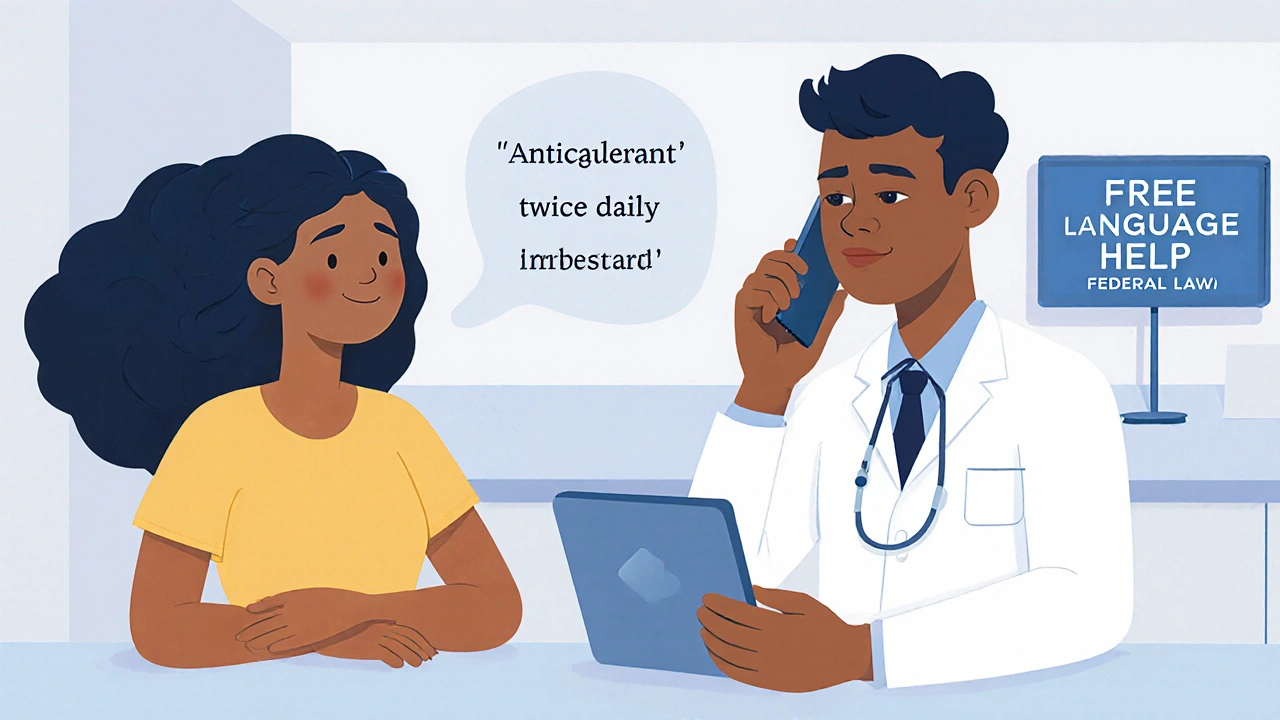
When you or a loved one gets a new prescription, understanding how to take it isn’t just helpful-it’s life-saving. But if English isn’t your first language, that understanding can slip away. Medication errors due to poor communication are three times more common among people with limited English proficiency, according to a 2012 study from UCSF. The good news? Federal law requires pharmacies to provide professional translation services at no cost to you. You don’t have to guess, rely on family, or risk a dangerous mistake.
What the Law Says About Language Help at Pharmacies
Under Title VI of the Civil Rights Act and Section 1557 of the Affordable Care Act, any pharmacy that receives federal funding-meaning nearly every chain and many independent ones-must offer free language assistance. This isn’t optional. It’s a legal requirement. That includes oral counseling about your medication, explaining side effects, dosage instructions, and warning labels. California’s SafeRx program sets the gold standard. By law, pharmacists there must use a professional interpreter-either in person or by phone-during every prescription counseling session if the patient doesn’t speak English well. And they can’t charge you a penny. Other states have similar rules, but California is one of the few that spells out exactly what counts as acceptable help. The U.S. Department of Health and Human Services has stepped up enforcement. Since 2016, there have been over 47 federal settlements against healthcare providers for failing to provide language services. One national pharmacy chain paid $1.2 million in 2022 just for not offering interpreters during medication counseling. You’re not asking for a favor-you’re claiming a right.Why Family Members or Bilingual Staff Aren’t Enough
It’s tempting to ask your teen who took Spanish in high school, or the cashier who speaks your language, to help. But that’s where things get dangerous. A 2021 study in JAMA Pediatrics found that using untrained people as interpreters increases the risk of serious medication errors by 49%. Why? Medical terms aren’t simple. Words like “hypertension,” “anticoagulant,” or “take on an empty stomach” don’t translate directly. Even fluent speakers don’t know the exact medical terms in another language unless they’ve been trained. Pharmacists themselves aren’t automatically qualified either. A 2022 audit by Language Scientific found that only 41% of pharmacy staff who claimed to be bilingual passed a basic test of medical terminology in their second language. The American Translators Association says true medical interpreters need at least 40 hours of specialized training, certification, and ongoing education. That’s not something you can pick up casually.How to Ask for an Interpreter-The Right Way
You don’t need to be an expert. Just say this clearly:I need a professional interpreter for my medication counseling.Don’t say, “Can someone help me?” or “Do you speak [language]?” That gives them an out. Be direct. If they offer a family member, say, “No, I need a trained interpreter. It’s my right under federal law.” If you’re in a chain pharmacy like CVS, Walgreens, or Rite Aid, ask to speak with the pharmacist. If they say they don’t have one on-site, ask for phone or video interpreting. Most have access to services like RxTran or Language Line. They’re required to connect you within minutes. If you’re in a smaller pharmacy and they hesitate, ask for the manager. If they still refuse, note the date, time, location, and names of staff involved. You can file a complaint with the Office for Civil Rights at HHS.gov. Enforcement is getting stronger-and your voice matters.
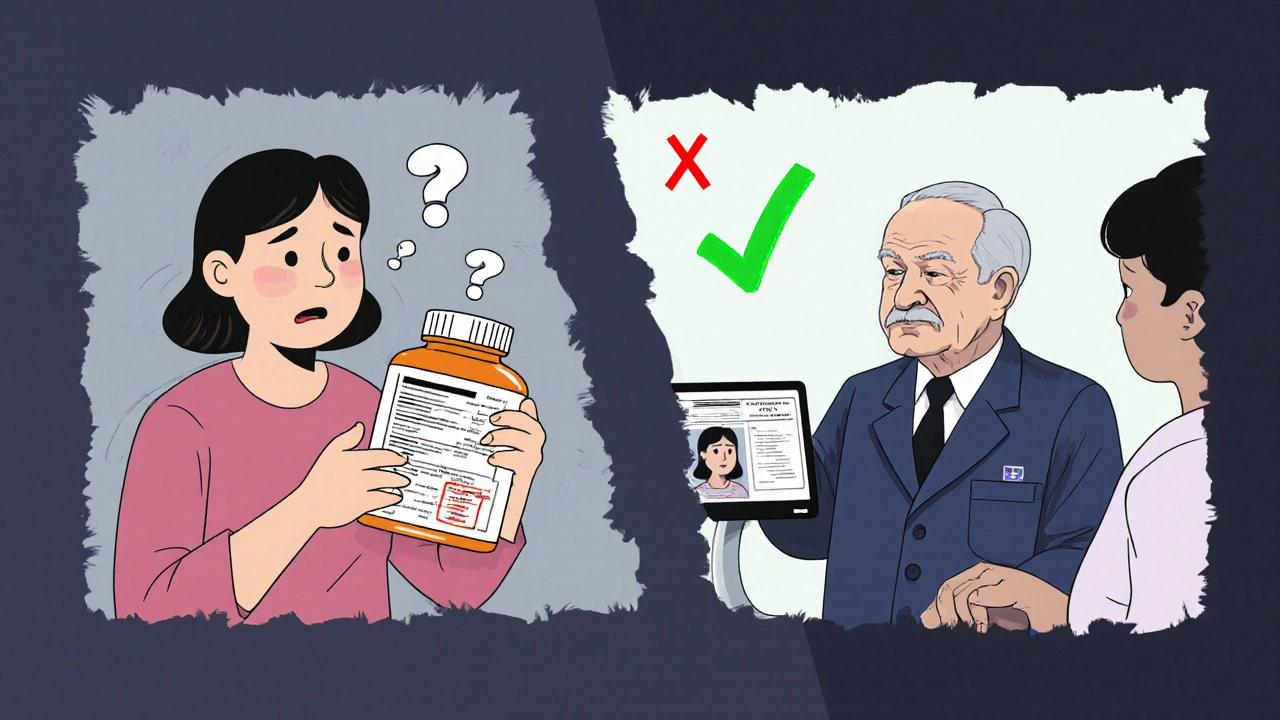
The Three Ways Pharmacies Provide Interpreters
Not all interpreter services are the same. Here’s what you’re likely to encounter:- Phone interpreting - Fastest and cheapest. Services like RxTran connect you in under 30 seconds 92% of the time. But it’s easy to get lost in a conversation without seeing facial expressions or gestures. Elderly patients, in particular, often find it confusing.
- Video interpreting - Now used by 65% of healthcare facilities. You see the interpreter, which helps with non-verbal cues. It’s more reliable than phone and less expensive than in-person. Still, poor internet can cause delays or dropouts.
- In-person interpreters - The most effective option, especially for complex counseling. Pharmacists report 78% better patient understanding when an interpreter is face-to-face. But they’re hard to find outside big cities. Most pharmacies can’t afford to keep one on staff full-time.
What Translation Materials Should Look Like
Written instructions matter just as much as spoken ones. The directions on your pill bottle (called “SIGs”) must be clear, accurate, and culturally appropriate. California’s Board of Pharmacy has translated SIGs into five languages: Spanish, Chinese, Korean, Russian, and Vietnamese. These aren’t just word-for-word translations. They’ve been reviewed by medical linguists to match how those languages express dosage and timing. For example, “take twice daily” doesn’t always mean “two times a day” in every culture-some languages use different concepts of time. But even the best translations have gaps. A 2022 survey found that 38% of Russian-speaking patients in California found the dosage instructions confusing because the grammar didn’t match how medical instructions are structured in Russian. That’s why verbal counseling with a trained interpreter is still essential-even when you have a printed sheet. New translations for Tagalog and Arabic are being piloted in Los Angeles as of early 2024. That’s because those languages now represent the fastest-growing LEP populations in the state.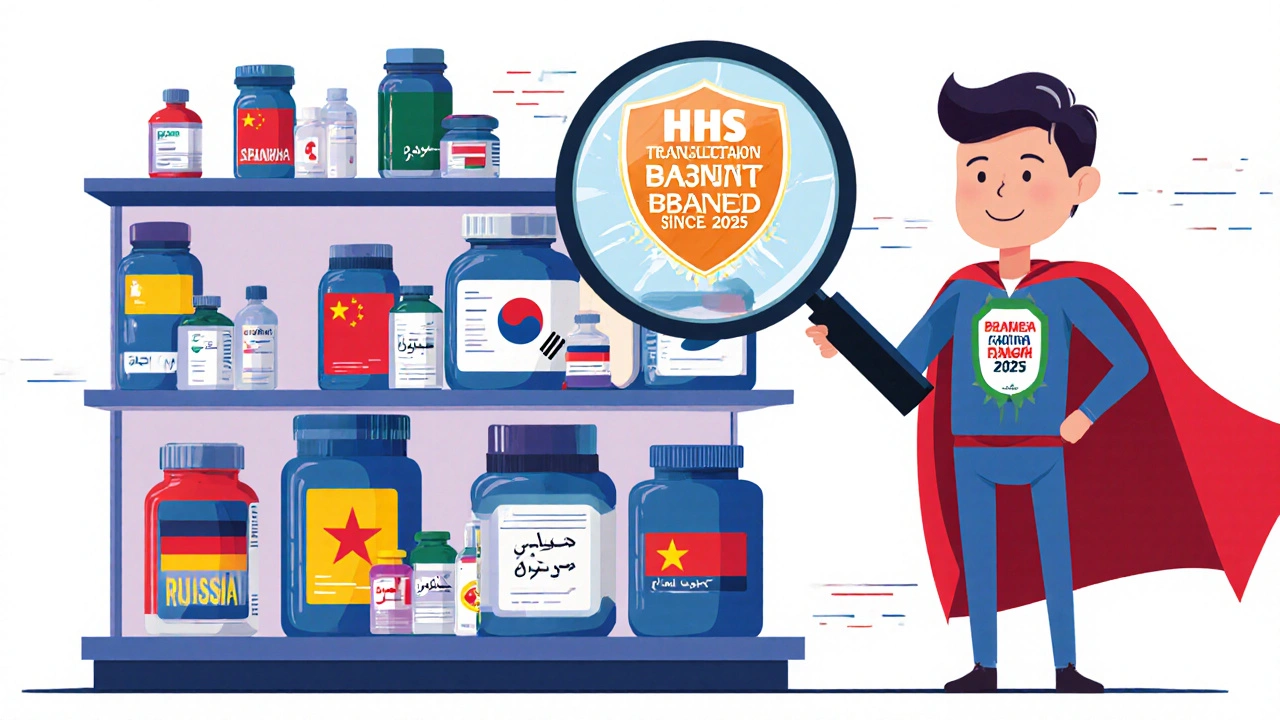
What to Do If Things Go Wrong
Sometimes, the system fails. The video call drops. The interpreter doesn’t know the word for “diarrhea.” The pharmacist says, “We don’t have one right now.” Here’s what to do:- Don’t leave without getting help. If they say, “We’ll call you back,” ask, “Can I wait here while you connect?”
- Ask for the name of the interpreting service they’re using. Most have a number you can call yourself.
- If you’re given a printed label in your language, check it against what the pharmacist says. If they contradict each other, ask for clarification.
- Write down what was said, even if it’s just keywords. You can show it to your doctor later.
- If you feel misled or unsafe, file a complaint with HHS’s Office for Civil Rights. You can do it online at HHS.gov/ocr. They’re required to respond within 180 days.
What’s Changing in 2025 and Beyond
New rules took effect January 1, 2025: AI translation tools like Google Translate or chatbots are now banned for use on prescription labels and medication instructions. Human review is mandatory. That’s because machines still get medical terms wrong-especially when it comes to dosage timing, drug interactions, and side effects. Medicaid is also expanding its reimbursement for interpreter services. For children in non-English-speaking households, the federal government now covers 75% of the cost instead of 50%. That’s pushing more pharmacies to invest in better systems. The market for pharmacy translation services is growing fast-$5.2 billion in 2023, and expected to keep rising. But smaller pharmacies still struggle. Nearly half say they can’t afford qualified interpreters. That’s why federal enforcement is targeting high-LEP areas in 15 states this year. If your pharmacy serves a large immigrant population, they’re under pressure to get it right.Final Checklist: Your Rights at the Pharmacy
Before you leave the pharmacy with a new prescription, make sure:- You spoke with a trained interpreter-not a family member or untrained staff.
- You understood the dosage, timing, and warnings.
- You received a written instruction sheet in your language.
- You were not charged for the interpreter service.
- You asked for clarification if anything was unclear.
Can I be charged for a translator at the pharmacy?
No. Under federal law, pharmacies cannot charge patients for interpreter services. This includes phone, video, or in-person interpreters. If someone tries to bill you, ask to speak with the manager and mention Section 1557 of the Affordable Care Act. You can also report the incident to the U.S. Department of Health and Human Services.
What languages are covered by pharmacy translation services?
There’s no federal list of required languages. Pharmacies must provide services in any language spoken by their patients. In practice, most offer support for Spanish, Chinese, Vietnamese, Korean, Russian, and Arabic. California requires written materials in five languages, and is adding Tagalog and Arabic. If your language isn’t listed, request an interpreter anyway-pharmacies are legally required to arrange it.
Can I use Google Translate or a phone app instead?
No. As of January 1, 2025, federal rules prohibit using AI tools like Google Translate for prescription labels, medication instructions, or counseling. These tools often misinterpret medical terms, dosages, and warnings. Only trained human interpreters or professionally translated materials are allowed. Even if the app seems accurate, it’s not legally acceptable for medical communication.
What if the interpreter doesn’t know medical terms?
If the interpreter struggles with medical words, ask if they’re certified in healthcare interpretation. If not, request a different interpreter. You can also ask the pharmacist to pause and explain the term slowly. Write it down. After the visit, call the pharmacy’s customer service and ask for a qualified interpreter to call you back. You have the right to understand your medication fully.
Do I need to bring my own interpreter?
No. Pharmacies are legally required to provide interpreters at no cost. You should never need to bring someone with you. If you choose to bring a family member, you still have the right to ask for a professional interpreter, especially for complex medications like blood thinners, insulin, or seizure drugs. Family members may mean well, but they’re not trained to handle medical details accurately.
How do I know if my pharmacy is compliant with language laws?
Look for signs in multiple languages near the prescription pickup area. Ask if they use a service like RxTran or Language Line. If they say they don’t have interpreters, ask why. Pharmacies serving large non-English populations are under federal scrutiny. If you’re unsure, you can check the pharmacy’s website for a language access policy-or call the Office for Civil Rights at HHS to report concerns. Compliance is not optional-it’s the law.
11 Comments
Anne Nylander
November 23 2025
THIS. I had a friend almost take double her insulin bc the pharmacist just shrugged and said ‘you know what this means right?’ NO I DONT. PLEASE SPEAK UP.
Leo Tamisch
November 24 2025
Wow. So we’ve reached the point where the government now mandates that pharmacists become bilingual interpreters. Next they’ll require them to know astrology for herbal interactions. 🤡
Daisy L
November 25 2025
Oh please. This is why America is falling apart-now we’re forcing pharmacies to hire interpreters for every language under the sun? What’s next? Do we need a translator for Klingon? 😒 We’re drowning in bureaucracy and it’s all because people won’t just LEARN ENGLISH.
Corra Hathaway
November 27 2025
Y’all are overreacting. This isn’t about language-it’s about safety. I’ve seen grandparents die because their grandkids translated ‘take with food’ as ‘take with rice.’ It’s not politics, it’s medicine. 💪❤️
Chris Vere
November 29 2025
There is a quiet dignity in demanding clarity when the system expects silence. The law does not ask for gratitude-it asks for compliance. That is not privilege. That is justice. And yet, we treat it like a favor granted by mercy rather than a right earned by contract. We forget that language is not a barrier-it is a bridge. And bridges are built to be crossed, not guarded.
When a man in Lagos receives insulin instructions in broken Yoruba from a pharmacy clerk who learned English from a YouTube video, he is not being served. He is being gambled with. The cost of that gamble is measured in hospital beds and funerals.
It is not enough to say ‘we provide interpreters.’ We must ask: Are they trained? Are they present? Are they listened to? Or are they a checkbox on a compliance form, a prop for the illusion of care?
The pharmacy is not a store. It is a threshold between life and death. And thresholds demand precision.
I have seen a man refuse his medication because the label said ‘take once daily’ and his uncle said ‘once daily’ means ‘when you remember.’ He was not stupid. He was not lazy. He was not ungrateful. He was simply told nothing that made sense to him.
Language is not a decoration. It is the architecture of understanding. And when the architecture collapses, people fall.
California’s rules are not radical. They are minimal. They are the bare minimum of decency. And still, we fight them like they are tyranny.
What does it say about us that we accept the risk of death as the price of convenience?
One day, someone you love will stand in that pharmacy. And they will not speak your language. Will you ask them to suffer silently? Or will you remind them-they have a right to be understood?
That is the question.
Pravin Manani
November 30 2025
From a clinical linguistics standpoint, the structural divergence between English SIGs and non-Western syntactic frameworks (e.g., topic-prominent languages like Tagalog or tone-based systems in Mandarin) creates profound cognitive dissonance in medication adherence. The 38% confusion rate among Russian-speaking patients isn't anecdotal-it's a systemic failure of lexical alignment. Medical interpreters require domain-specific semantic mapping, not just bilingual fluency. The AMA’s 2023 guidelines on LEP communication mandate CCHI or NBCMI certification-yet 62% of rural pharmacies still rely on ‘bilingual techs’ without formal training. This isn’t about access-it’s about epistemic justice. We’re not just translating words; we’re preserving pharmacological integrity.
Franck Emma
December 2 2025
My grandma died because they gave her the wrong pill. No interpreter. No paper. Just ‘it’s fine.’
Noah Fitzsimmons
December 3 2025
Oh wow, another ‘you’re not allowed to use Google Translate’ article. Did you also know the sky is blue? I’m shocked that people don’t understand that apps are dumb. Who knew?
Eliza Oakes
December 4 2025
Wait, so now we’re saying family members can’t help their own parents because they’re ‘untrained’? That’s ridiculous. My cousin speaks Spanish and helped my abuela for years-she’s not a professional, but she loves her. You’re criminalizing love now?
Clifford Temple
December 6 2025
This is why we can’t have nice things. We’re giving away our healthcare system to every language under the sun. Why not just make everyone learn English? It’s not hard. We’re not a United Nations clinic. We’re America. And we’re drowning in this nonsense.

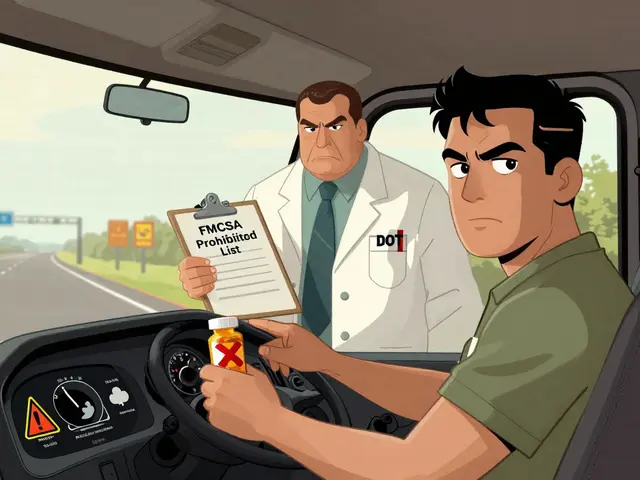
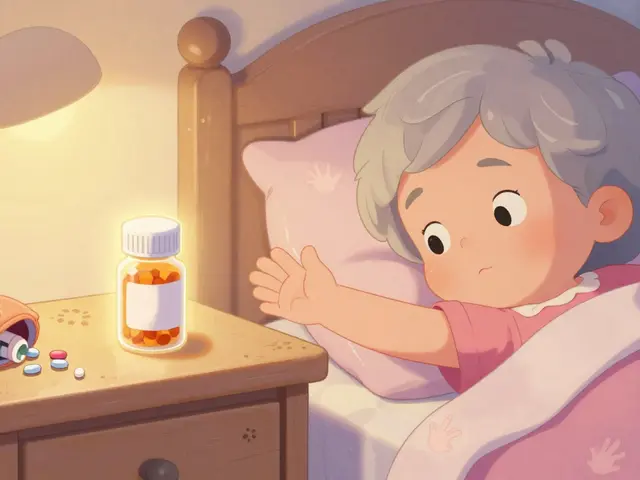

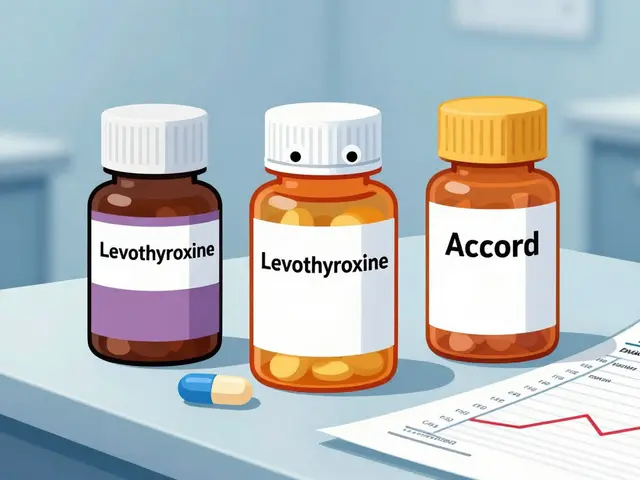

Mark Kahn
November 21 2025
Just wanted to say this is super important info. I work at a clinic and we’ve had patients cry because they were too scared to ask for help. You’re not being difficult-you’re being smart. Keep pushing for clarity.